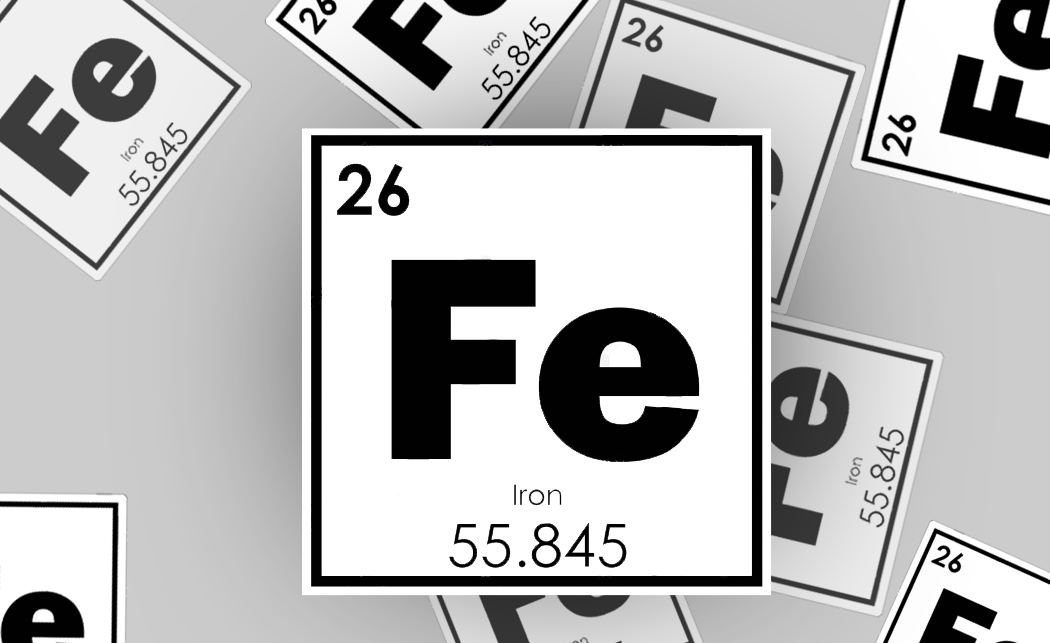
Around a third of women of childbearing age have a blood iron deficiency, including 5% who are anemic (source: in France - Health Insurance - Ameli.fr)
Anemia very often results from a long-term iron deficiency and treatment often requires taking a daily food supplement for several months .
Unfortunately, iron treatment is often associated with side effects such as stomach aches, nausea or constipation...
In this article, we have compiled some key information to help you choose your Iron food supplement and follow your treatment, without stress, with tangible results and without discomfort.
3 essential things to know about iron
-
Iron is an essential trace element :
It is a substance present in small quantities within the body, but essential for its proper functioning.
It is the iron in red blood cells that carries blood oxygen and therefore there is a direct relationship between a lack of iron and the effects of under-oxygenation: pallor, fatigue, headaches, etc. -
Iron is not synthesized by the body :
It must be provided in targeted quantities to compensate for losses which vary enormously depending on the category of people (sex and age in particular). The main sources of losses are linked to blood loss, hence the increased needs of menstruating women (and pregnant women for the needs of the fetus). -
Excess iron is as harmful as deficiency .
Excess iron is as harmful as iron deficiency because it increases free radicals and oxidation.
Who is concerned by iron supplementation?
Iron is well recycled in the body. This explains why daily requirements are low.
However, these needs are increased for various reasons: blood loss; increased needs (athletes, growing young people); low assimilation (seniors or plant-based diets).
The following people are more affected:
- Menstruating women
- Pregnant women
- Long-distance athletes first and foremost
- young people growing up
- Elderly people
Particular attention should be paid to people whose diet is mainly composed of plants. Indeed, even with foods high in iron that allow sufficient theoretical intake, the low assimilation of non- heme iron must be taken into account.
This absorption is only in the range of 2 to 10% of the iron ingested. However, it is possible to increase this percentage by combining absorption boosters such as Vitamin C.
It is in these situations that the choice of a food supplement rich in iron should be considered, even if some precautions must be observed.
What precautions should be taken for an ideal iron supplement?
Avoid long-term self-medication
In case of fatigue, headaches, pallor, fatigue during frequent and repeated exertion, consider consulting your doctor to obtain a blood iron test.
Excess iron is as harmful as iron deficiency because it increases free radicals and oxidation.
However, due to the difference between ingested and assimilated iron ( see our article on the role of iron ), there is no risk of excess iron with a supplement of 15 mg per day corresponding to the Recommended Nutritional Intake (and the dosage of the Argalys Essentiels Iron supplement for one capsule).
As a precaution, we recommend consulting your healthcare practitioner for any long-term treatment (more than 2 months).
Avoid things that decrease iron absorption
The body has difficulty absorbing iron .
On average, 20% of heme iron and 2 to 10% of non-heme iron are actually absorbed. Moreover, this absorption is highly dependent on other nutrients present at the same time in the stomach and upper intestine.
This is particularly the case with tannins in tea and coffee, which reduce absorption by around 30 to 40%, or chocolate.
We recommend spacing these drinks 1 hour apart from taking your Iron food supplement .

What criteria should be used to choose an iron food supplement?
Nutrients that facilitate the assimilation of iron
The actual absorption of non-heme iron (of plant origin, noted Fe 3+ or Ferric Iron) is lower than that of heme iron (Fe2+ or Ferrous Iron) but can be significantly increased with the presence of 'enhancing' elements:
- Vitamin C, in moderate amounts, is the most potent known facilitator of non-heme iron absorption (work by Cook and Monsen, 1977).
- B vitamins, including folic acid (B9), are essential for iron metabolism.
- It appears that plant fibers are a factor in improving absorption, probably to the extent that they improve intestinal transit (without established certainty due to a lack of repeated studies – work by Cook 1981).
Iron Bisglycinate also called “Soft Iron”
Among the many types of iron salts present in dietary supplements, iron bisglycinate is a form well suited for supplementation:
The combination with an amino acid (glycine) allows the iron to resist stomach acids and pass through the intestinal barrier more easily. This is a good compromise between intake and comfort when taking it.
However, most supplements are in the form of iron oxide or sulfate. Although their iron content is high, they are quite disruptive to the digestive system and can cause nausea or diarrhea.
Dietary supplements that reduce nausea reactions
Iron consumption is often associated with adverse side effects such as abdominal pain, nausea, vomiting, etc.
These effects are reduced and almost zero with food supplements which have the following characteristics:
- Iron Bisglycinate reduces the risk of intestinal disorders thanks to its low acidity
- A daily dosage equivalent to the RDA (Recommended Daily Intake) or 15 mg of iron
- in a gastro-resistant capsule to the acidity of the stomach to allow the release of iron in the upper part of the intestine and avoid the risk of nausea, which is common if the capsule opens in the stomach.
These features ensure your comfort when taking.
The food supplement Iron, Argalys Essentiels: a solution suitable for everyone
The Argalys Essentials Iron food supplement is designed with all the positive properties mentioned above.
We have selected iron in the form of Bisglycinate, combined with assimilation boosters: natural vitamin C, organic carrot extract, a source of provitamin A and fiber, and vitamin B9.
Each capsule contains 14 mg of iron, which helps correct iron deficiency without the risk of excess.
And to avoid the risk of nausea, the capsules are gastro-protective. Argalys FER is certified vegan. It's a safe and effective supplement for everyone.
The Argalys team
Bibliography and useful links:
- Cockell KA et al. Application of the Dietary Reference Intakes in developing a recommendation for pregnancy iron supplementations in Canada. Am J Clin Nutr 2009; 90:1023-8
- https://www.irbms.com/mineraux-fer-fe-sport/
- https://fr.wikipedia.org/wiki/Fer_(m%C3%A9dicament)
- Effects of folic acid supplementation during different pregnancy periods and relationship with the other primary prevention measures to neural tube defects. Gong R, Wang ZP, Wang M, Gao LJ, Zhao ZT. J Matern Fetal Neonatal Med. 2016 Dec;29(23):3894-901. doi:10.3109/14767058.2016.1152241. Epub 2016
- http://campus.cerimes.fr/nutrition/enseignement/nutrition_9/site/html/1.html
- https://www.jle.com/fr/revues/abc/e-docs/strategie_de_dosage_de_la_ferritine_serique_chez_les_femmes_de_16_a_45_ans_dans_les_centres_dexamens_de_sante_50909/article.phtml
Our Essentials rich in Iron Bisglycinate:
Iron + Vitamin C, B9 and Carrot
€18.50 for a 2-month treatment!
 04 74 03 98 80
04 74 03 98 80










